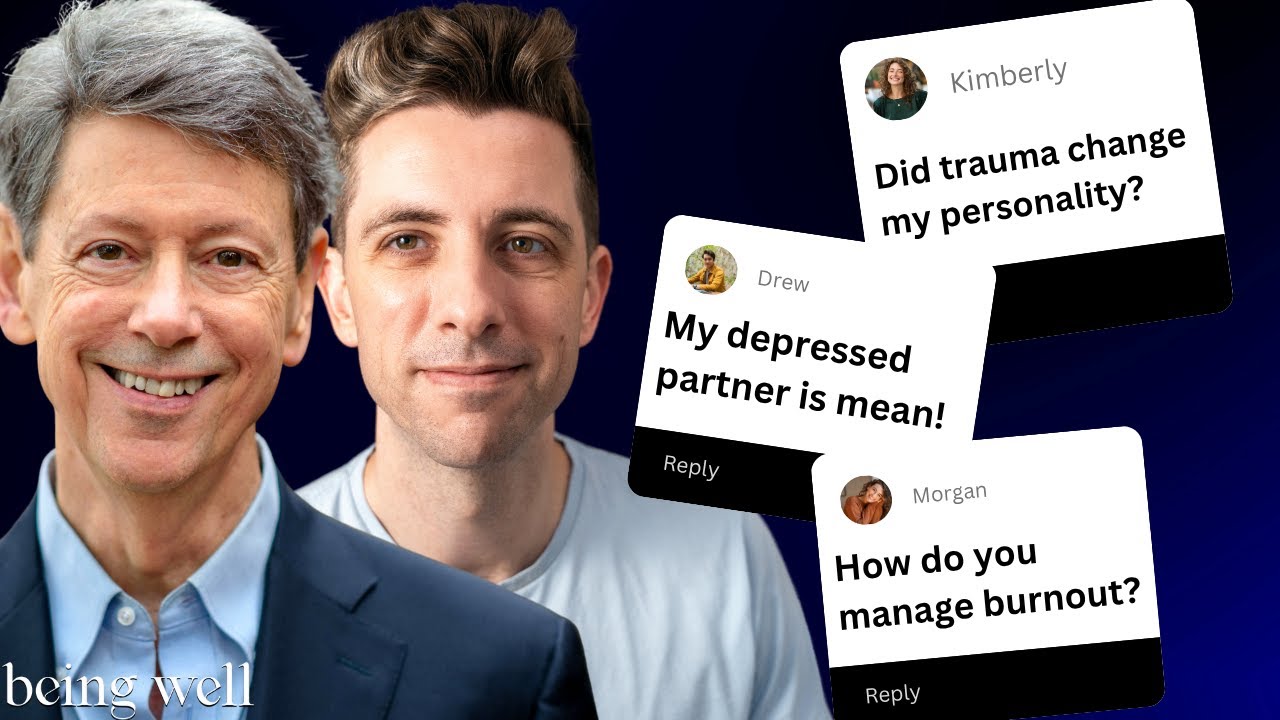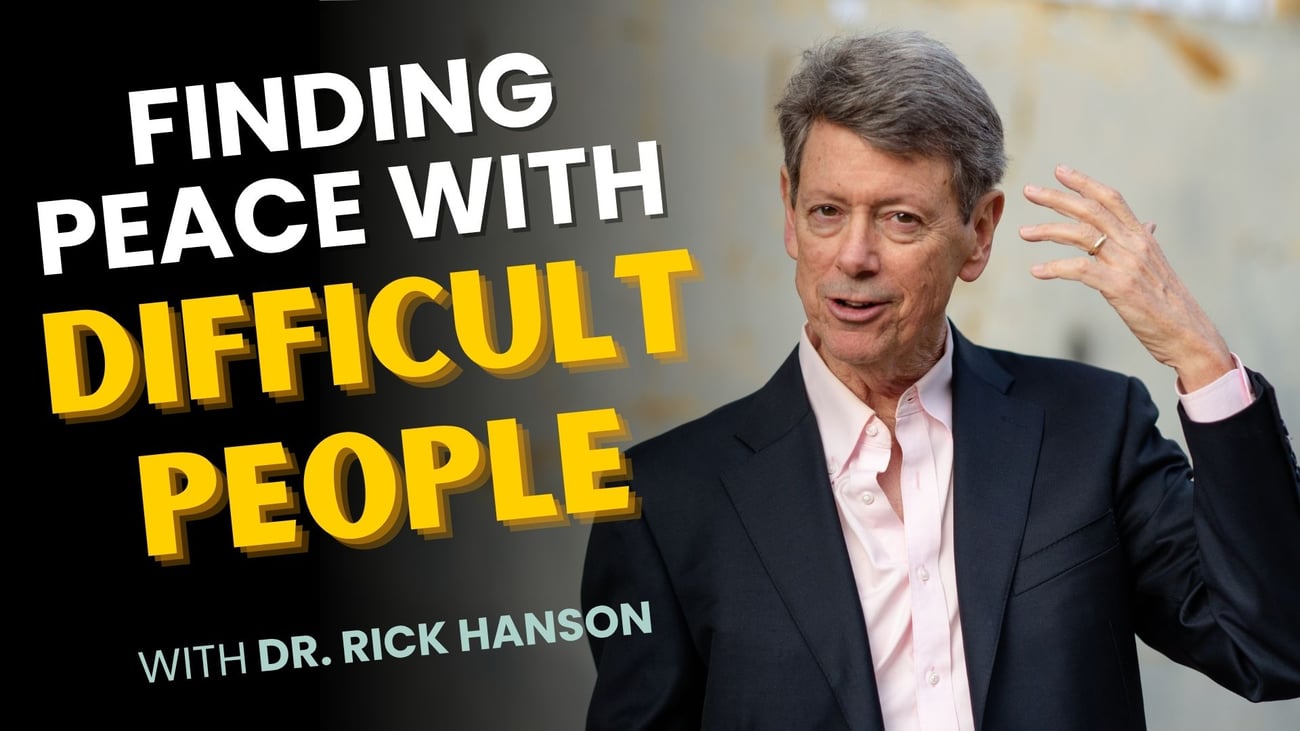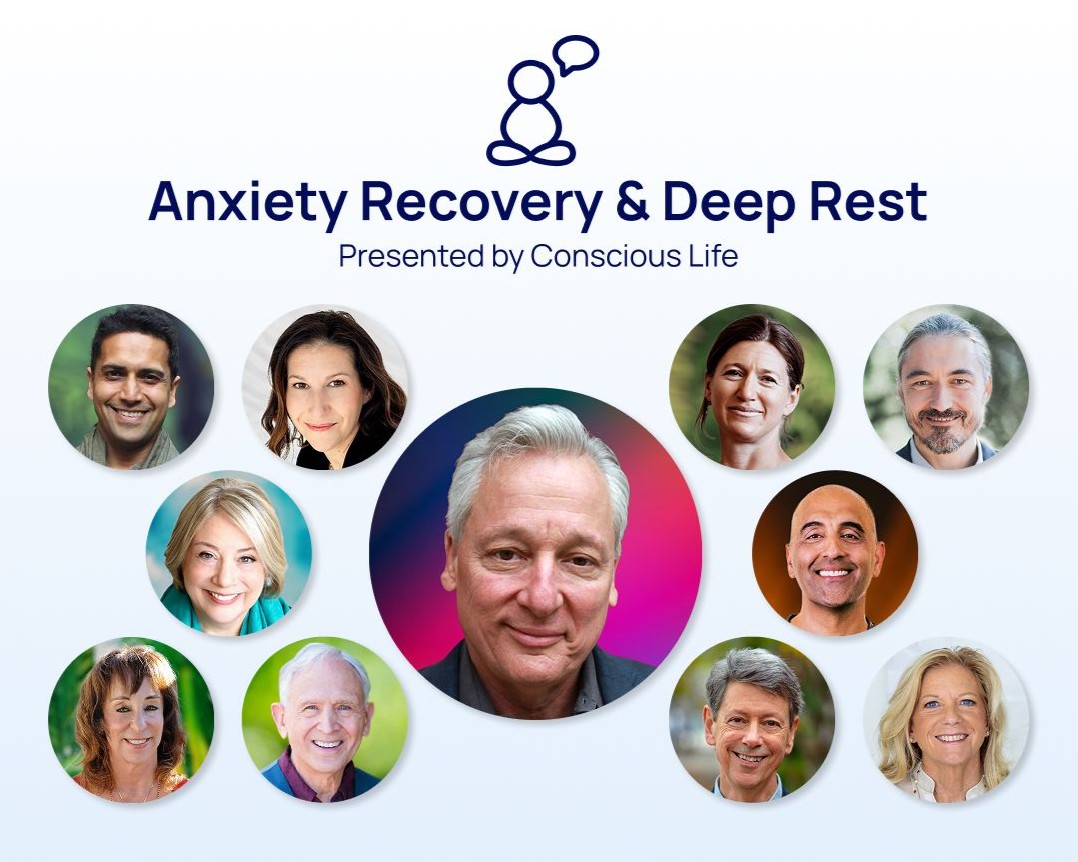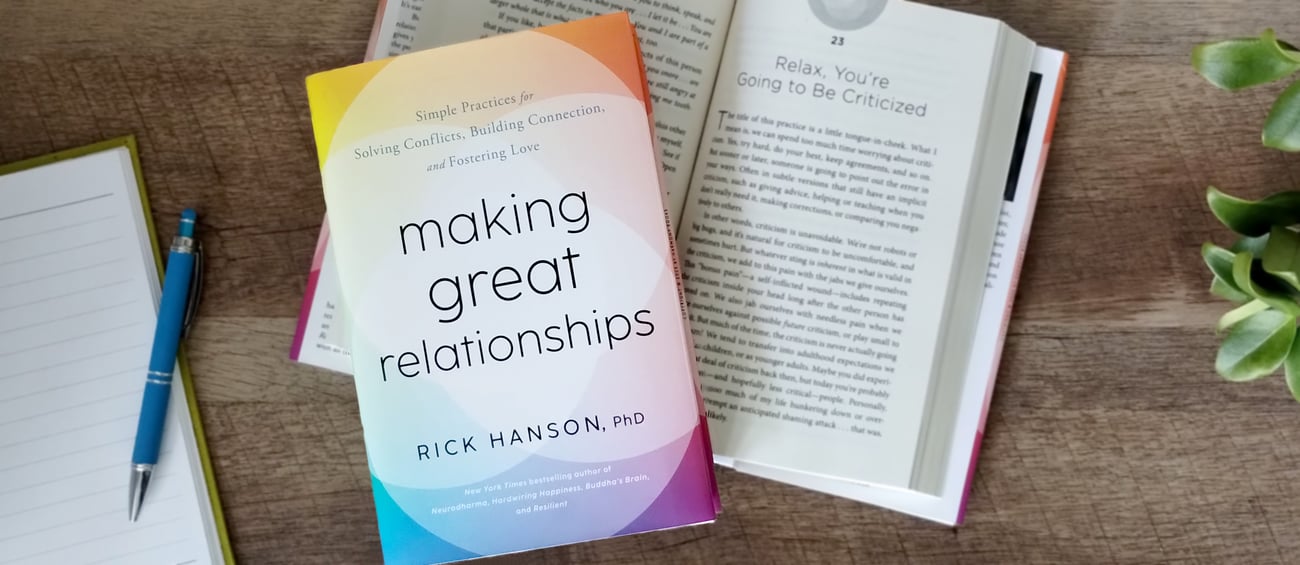 |
Just One Thing |
|
|
|
Simple Practices for Resilience and Happiness from |
|
DR. RICK HANSON |
 |
|
|
|
|
I'm delighted to invite you to a special, FREE live event I'll be cohosting with Thomas Hübl tomorrow: Building Resilience Through Compassion - which is part of the Collective Trauma Summit. In this hour-long conversation, Thomas and I will explore how compassion can help us move from helplessness into wise, purposeful action. If you've been feeling overwhelmed by the pain of the world, this is an opportunity to reconnect with the healing potential that compassion makes possible—both within yourself and as part of the collective world we share. Register for the summit here to get access to this free event. I hope to see you there! |
|
|
|
 |
There's been mistreatment or injustice - now what? |
THE PRACTICE: |
Stay Right When You're Wronged. |
|
|
— Why? — |
|
It’s easy to treat people well when they treat you well. The real test is when they treat you badly. (Much of what I say here applies to concerns about injustice or mistreatment that threatens or happens to others, from someone bullying a child to an oppressive government, but I will focus on the personal level.)
Think of times you’ve been truly wronged, in small ways or big ones. Maybe someone stole something, turned others against you, broke an agreement, cheated on you, or spoke unfairly or abusively.
When things like these happen, I feel mad, hurt, startled, wounded, sad. Naturally it arises to want to strike back and punish, get others to agree with me, and make a case against the other person in my own mind.
These feelings and impulses are normal. They may also bring an energy, focus, and power that’s needed to fight back (one way or another) against an attacker or escape or protect others. I’ve been involved in a few of these kinds of situations myself. Still, I haven’t had to face many of the things that people deal with who are not white or male, or privileged in other ways that I’ve been. So take whatever you find useful in my perspective below, and of course leave the rest.
When we get caught up in reactions and go overboard beyond whatever is necessary and useful, there’s usually a feeling of justification, release, and gratification. It feels good.
For a little while.
But bad things usually follow. The other person often overreacts, too, in a vicious cycle. Other people – relatives, friends, co-workers – get involved and muddy the water. We don’t look very good when we act out of upset, and others remember. It gets harder to work through the situation in a reasonable way. After the dust settles, you feel bad inside.
Consider this saying: “Blasting another person with anger is like throwing hot coals with bare hands: both people get burned.”
Sure, you need to clarify your position, stand up for yourself, set boundaries, and speak truth to power. The art – and I’m still working on it, myself! – is to do these things without the fiery excesses that have bad consequences for you and others. |
— How? — |
|
Start by getting centered, which often takes just a dozen seconds or so:
- Pause – You rarely get in trouble for what you don’t say or do. Give yourself the gift of time, even just a few seconds.
- Have compassion for yourself – This is a moment of feeling “ouch, that hurts, I wish this hadn’t happened.” A neurologically savvy trick for activating self-compassion is first to recall the feeling of being with someone who cares about you.
- Get on your own side – This means being for yourself, not against others. It can help to remember a time when you felt strong, like doing something that was physically challenging, or sticking up for someone you loved.
- Make a plan – Start figuring out what you’re going to do, or at least where you’ll start.
And now that you’re on firmer ground, here are some practical suggestions; use the ones you like:
- Clarify the facts – What actually happened?
- Rate the bad event accurately – On a 0 – 10 awfulness scale (a dirty look is a 1 and nuclear war is a 10), how bad was it, really? If the event is a 3 on the awfulness scale, why have emotional reactions that are a 5 (or 9!) on the 0 – 10 upset scale?
- See the big picture – Recognize the neutral or even good aspects of the situation mixed up with the bad ones (without denying or downplaying what’s bad). Put the situation in the larger context of unrelated good things happening for you currently, and over the course of your lifetime altogether.
- Reflect about the other people involved – Consider the “10,000 causes” upstream that led them to do whatever they did. Be careful about assuming it was intentional; much of the time you’re just a bit player in other people’s drama. Try to have compassion for them, which will make you feel better. If applicable, take responsibility for your own part in the matter (but don’t blame yourself unfairly). You can have compassion and forgiveness for others while still seeing their actions as unskillful, harmful, unfair, or immoral.
- Do what you can, concretely – As possible, protect yourself from people who wrong you; shrink the relationship to the size that is safe. Get support; it’s important for others to “bear witness” when you’ve been mistreated. Build up your resources. Get good advice – from a friend, therapist, lawyer, or even the police. As appropriate, pursue justice.
- Act with unilateral virtue – Live by your code even if others do not. This will make you feel good, lead others to respect you, and create the best chance that the person who wronged you will treat you better in the future.
- Say what needs to be said – There is a good formula from the field of “nonviolent communication”: “When X happens (stated objectively; not “when you are a jerk”), I feel Y (emotions; not “I feel you are an idiot”), because I need Z (deep needs like: “to be safe, respected, emotionally close to others, autonomous and not bossed around”).
Then, if it would be useful, you can make a request for the future. Some examples: “If I bother you, could you talk with me directly?” “Could you not swear at me?” “Could you treat your agreements with me and your children as seriously as you do those at work?”
- Move on – For your own sake, start releasing your angry or hurt thoughts and feelings. Stop your mind from obsessing about the past, and focus on the present and future. Turn toward what is going well, what you’re grateful for. Do things that feel pleasurable.
In the garden of your life, you have to pull some weeds, sure, but mainly focus on planting flowers.
- Be at peace – All you can really do is what you can do. Others are going to do whatever they do, and realistically, sometimes it won’t be that great. Many people disappoint: they’ve got a million things swirling around in their heads, life’s been tough, there were issues in their childhood, their ethics are fuzzy, their thinking is clouded, etc. It’s the real world, and will never be perfect.
We need to find peace in our own hearts, not out there in the world. A peace that comes from keeping eyes and heart open, doing what one can, and letting go along the way. |
| Read this Online |
|
|
Know someone who could use more peace after being wronged? |
|
Share this Just One Thing practice with them! |
|
Share on Facebook | Tweet on X | Forward this Email |
|
|
|
|
|
|
NEW ON THE BEING WELL PODCAST |
Trauma or Personality, When to Walk Away, and Burnout: October Mailbag |
 |
|
Dr. Rick and Forrest open up the mailbag to answer listener questions about trauma and its impact on personality, boundaries, anger, and burnout. They discuss how to distinguish the authentic self from the patterns we needed to learn to survive, how to balance duty to self with duty to others, and how to work with explosive anger by first joining with it. Finally, they discuss the importance of moving from empathic distress to compassion in order to prevent caregiver fatigue. Topics include cognitive defusion, taking a bird’s eye view, filling your own cup, and being with your feelings without judging them. |
| Check out the Episode |
|
|
|
|
|
|
NEW FROM THE WEDNESDAY MEDITATIONS + TALKS |
How to Shift Your Thoughts and Feelings about Others |
 |
|
Last week I offered a live meditation on Embodied Uplifting into Vastness, followed by a talk on How to Shift Your Thoughts and Feelings about Others, and I hope you'll check it out.
If you haven't yet, sign up to join me every week for this free, live offering.
|
| Check It Out |
|
|
|
|
|
|
MORE GOOD STUFF |
|
|
|
SCIENCE NEWS (VIEW ARCHIVE HERE)
Scientists tracked over a thousand tornado-like dust devils on Mars and found the planet’s winds are way stronger - and wilder - than we thought.
|
|
|
|
FOR PARENTS
Out of our marriage and experience with many couples with children, here’s a Top Ten list (in no particular order) addressed to parents; hopefully some of these suggestions will fit your relationship!
|
|
|
 |
|
If anxiety or tension has been showing up lately — as it does for so many of us — you may want to check out this free online conference hosted by my friends at Conscious Life. I'm honored to join the 60+ experts for this weeklong event designed to calm the body, steady the mind, and rest in a deeper sense of peace.
|
|
|
|
|
|
|
HAVE YOU READ IT YET? |
Making Great Relationships |
 |
|
Learn 50 simple practices for solving conflicts, building connection, and fostering love. Available in Hardcover, Paperback eBook, and Audiobook, wherever books are sold.
|
| Get Your Copy |
|
|
|
|
|
|
WORDS OF WISDOM |
"It’s easy to treat people well when they treat you well. The real test is when they treat you badly." |
|
— RICK HANSON, PHD |
|
|
|
|
JUST ONE THING (JOT) is the free newsletter that suggests a simple practice each week for more joy, more fulfilling relationships, and more peace of mind. A small thing repeated routinely adds up over time to produce big results.
Just one thing that could change your life.
(© Rick Hanson, 2024) |
|
|
|
|
|
|
|
|